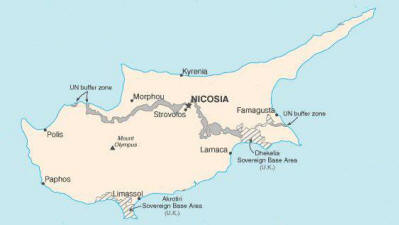A Brief History of Cyprus
Turkish Intervention and TRNC (1974 -)
During the presidential elections of 1974, Makarios clearly renounced the cause of enosis, and was re-elected with 95% of the cast votes. He subsequently ordered the withdrawal of mainland Greek officers, whereupon the National Guard, which was under the command of Greek officers, stormed the presidential palace in Nicosia. Makarios escaped, but this attempted coup, sponsored by the military junta in Greece, persuaded Turkey to intervene, as a guarantor power.
On the 20th July 1974, after consultation with Britain, Turkey intervened with a Peace-Keeping Action to protect the Turkish Cypriot community. This was in exercise of the powers of guarantee agreed in the Treaty of Zurich.
 |
| Cyprus Post 1974 |
Launched with relatively few troops, the Turkish landing had limited success at first, and resulted everywhere on the island in the occupation of Turkish-Cypriot enclaves by the Greek forces. After securing a more or less satisfactory bridgehead Turkish forces agreed to a cease-fire on 23 July 1974. A conference of the guarantor powers, Greece, Turkey and Britain, met in Geneva on 25 July. Meanwhile Turkish troops did not refrain from extending their positions, as more Turkish-Cypriot enclaves were occupied by Greek forces. In a two-stage offensive, Turkish troops took control of 38% of the island. 200,000 Greek Cypriots fled the Turkish forces while up to 60,000 Turkish Cypriots were transferred to the occupied areas, and a new cease-fire line was agreed. On 30 July the powers agreed that the withdrawal of Turkish troops from the island should be linked to a "just and lasting settlement acceptable to all parties concerned." The declaration also spoke of "two autonomous administrations - that of Greek-Cypriot community and that of the Turkish-Cypriot community."
Since this time the island has remained divided. On the 15th November 1983 The Turkish Republic of Northern Cyprus was founded. It is a fully democratic state and with exception of a few border incidents, internal peace has been established.
UN-led talks on the status of Cyprus resumed in December 1999 to prepare the ground for meaningful negotiations leading to a comprehensive settlement. Efforts to reunite the island under a federal structure continue, however, under the auspices of the United Nations. As Cyprus planned to join the European Community in May 2004, there were renewed negotiations about the status of the Island. In December 2003, the borders between the two parts of Cyprus were partly opened, numerous Greek Cypriots visited the north, and labour migration of Turkish Cypriots to the south, especially Nicosia began.
A referendum on the Annan Plan, a United Nations proposal for reunification was placed before both communities in April, 2004. The plan was rejected by the Greek Cypriots while approved by the Turkish Cypriots but required the approval of both sides to succeed.
In February, 2008, the election of a new president in the Republic of Cyprus brought a new boost to the peace process, and a final settlement of "The Cyprus Problem" looked closer than it had for a long time.
Soon afterwards, the Lokmaci/Ledra Street crossing in central Nicosia was opened to much jubilation, forty years after its closing. In July of that year, the two presidents issued a joint statement committing themselves to a solution of the Cyprus problem. A further statement in December of 2009 indicated hopes of a settlement by the end of 2010.
Things slowed down for a while at the start of 2010 because of elections in Northern Cyprus, and in April a new leader was elected. Although a known hard liner, the new leader, Mr Ergolu, assured the United Nations that the talks would continue, which they have done.
In the Autumn of 2010, a further crossing point was opened between Yesilirmak (Limnitis) and Kato Pyrgos in the far west of the island. There is also a strong movement from both sides of the divide to open further crossings south of Lefke, and east of Nicosia.
Since the new set of talks started in 2008, the two leaders have had 88 meetings up till the end of November 2010. Movement, however, has been painfully slow, with both sides blaming the other and there being selective leeks to the press to prove their case.
It is evident that the international community is getting thoroughly fed up with this lack of movement, and the UN Secretary-General, while not issuing an ultimatum, has made it obvious that he expects some sort of resolution by the Spring of 2011. After that date, presidential elections in south Cyprus and Turkey will probably bring the talks to a halt for six months at the very least.
In his report to the United Nations Security Council on the 24th November 2010, The Secretary-General details events to date, and what he expects for the future. While couched in diplomatic terms, the report is effectively Ban Ki-Moon banging the two presidents' heads together.
We wait to see!